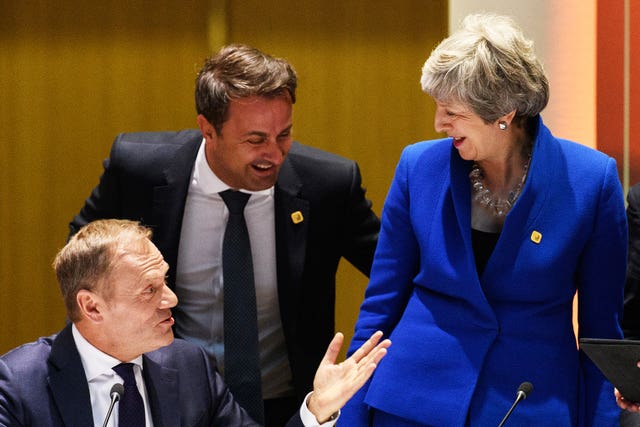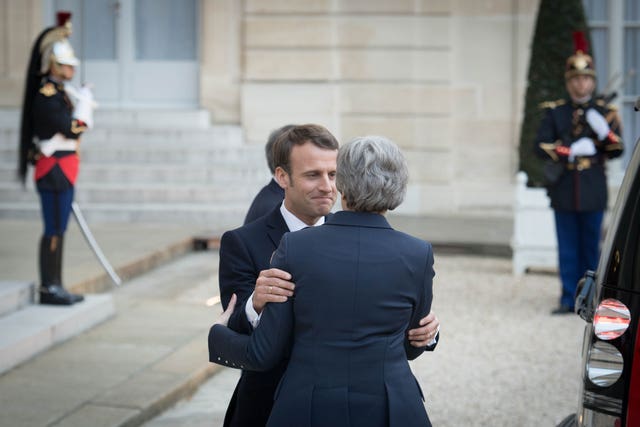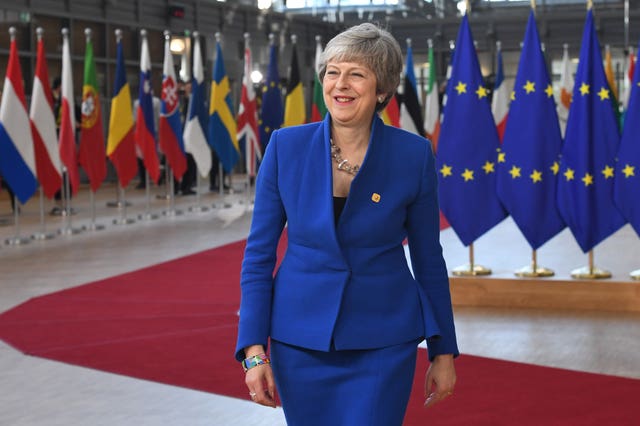Theresa May could cling to power for as long as a year, as EU leaders looked set to offer the UK a lengthy delay to Brexit.
Although French president Emmanuel Macron insisted that “nothing is settled”, other leaders arriving at an emergency summit in Brussels indicated they were ready to back European Council president Donald Tusk’s proposal of a long extension to Article 50 talks.
Mrs May has asked for a delay to June 30, with a break clause allowing the UK to leave as soon as Parliament has ratified her Withdrawal Agreement.
But pressed over whether she stood by her comment in Parliament that “as Prime Minister” she would not delay Brexit beyond the end of June, she responded that the important issue was securing the flexibility to leave early and avoid having to take part in European elections in May.
Tory sources said that the PM stood by commitments made to the backbench 1922 Committee that she would hand over to a successor for the second phase of negotiations after ratification.

Mr Tusk’s proposals could postpone the opening of the next phase, dealing with the future UK/EU trade and security relationship, to the spring of 2020.
Mrs May set out her case for a short extension in a presentation behind closed doors lasting around one hour, during which she answered questions from the leaders of the 27 other member states.
She then left the room to allow the EU27 to discuss the UK’s future in her absence over a dinner of scallop salad, loin of cod with brown shrimps and iced macadamia nut parfait.
This is the moment Theresa May and Angela Merkel shared a laugh over an iPad before EU leaders sat down for Brexit extension talks pic.twitter.com/G2YVEcyuh5
— Press Association (@PA) April 10, 2019
An apparently relaxed Prime Minister laughed and smiled with Angela Merkel as the German chancellor showed her pictures on her tablet computer depicting the pair wearing jackets of exactly the same shade of blue as they addressed their parliaments earlier in the day.
Mrs Merkel told German MPs that the EU27 “may well” go for a longer delay, although the UK would be allowed to leave “very quickly” if Parliament approves a withdrawal deal.
But as he arrived in Brussels, Mr Macron insisted that “for me, nothing is settled, and in particular no long extension”.
Despite having face-to-face talks with the PM in Paris on Tuesday, the French President said he needed more “clarity” and was “impatient” to hear what Mrs May would say.

“We must understand today why this request? What is the political project which justifies it and what are the clear proposals?” he said.
Mrs May said: “I have asked for an extension to June 30, but what is important is that any extension enables us to leave at the point at which we ratify the Withdrawal Agreement, so we can leave on May 22 and start to build our brighter future.”
In a swipe at the Brexit rebels who blocked her Withdrawal Agreement from passing through Parliament in time to leave on the scheduled date of March 29, Mrs May said: “I know many people are frustrated that the summit is taking place at all, because the UK should have left the EU by now.
Prime Minister @theresa_may is in Brussels for the European Council summit #EUCO @10DowningStreet pic.twitter.com/M4WFXl6qt7
— UKREP 🇬🇧🇪🇺 (@ukineu) April 10, 2019
“I greatly regret the fact that Parliament hasn’t been able to pass a deal that would have enabled us to leave in a smooth and orderly way.
“But I and the Government continue to work to find a way forward. We have been talking with the opposition. There’s been serious and constructive talks and they will continue tomorrow.”
Other leaders said that the main condition likely to be imposed in return for any extension was that Britain should prepare for European Parliament elections on May 23, though it need not actually vote if ratification is achieved earlier.
Lithuanian President Dalia Grybauskaite rejected suggestions that countries like hers now held Britain’s fate in their hands.

“It is only up to the UK to decide,” she said. “Your country’s future is only in your hands, nobody else. It’s only up to you.
“You decide your fate, not us. We would only like to help you make this decision.”
Labour’s Jeremy Corbyn welcomed comments from Irish Taoiseach Leo Varadkar suggesting he is ready to contemplate a role for the UK in helping decide EU trade policies if it remains in a customs union after Brexit.
Mr Varadkar said that it would be in the UK’s interests to remain within the European trading bloc.
And he added: “It’s also in our interest to have the UK to be in our bloc and I think we would be generous in understanding that the UK couldn’t be a silent partner and would have to have a say in decisions being made.”
The Irish prime minister @LeoVaradkar has confirmed this evening that Labour’s alternative plan for a new customs union with a UK say on future trade deals is credible and deliverable.https://t.co/hlomXy0Xnq
— Jeremy Corbyn (@jeremycorbyn) April 10, 2019
A customs union arrangement with a British say on trade deals is a central plank of Labour’s plan for Brexit.
Mr Corbyn responded with a tweet: “The Irish prime minister Leo Varadkar has confirmed this evening that Labour’s alternative plan for a new customs union with a UK say on future trade deals is credible and deliverable.”
The unanimous agreement of all 27 remaining EU states is needed to avoid a no-deal Brexit at 11pm on Friday, April 12.
We are taking stock of #Brexit preparations and provides practical guidance to #Prepare4Brexit and ensure coordinated EU approach in 5 areas.More in our press release → https://t.co/soXs3Bgi46and in our thread ↓ pic.twitter.com/bOtvwbAvsl
— European Commission 🇪🇺 (@EU_Commission) April 10, 2019
The depth of the anger within Tory ranks was underlined by a Commons vote on Tuesday, when 97 Tory MPs voted against a motion backing Mrs May’s call for an extension.
But pro-EU Justice Secretary David Gauke suggested she could carry on as PM until she has taken the country through the current phase of the negotiations and Britain has finally left the EU.
“I don’t think we should be rushing to change our leader when there is a big task to be done,” he told BBC Radio 5 live.
“If we are going through that process of trying to get Parliament to support a deal to find a way of breaking this deadlock, then Theresa May continues to be the right person to lead us through that process.”
